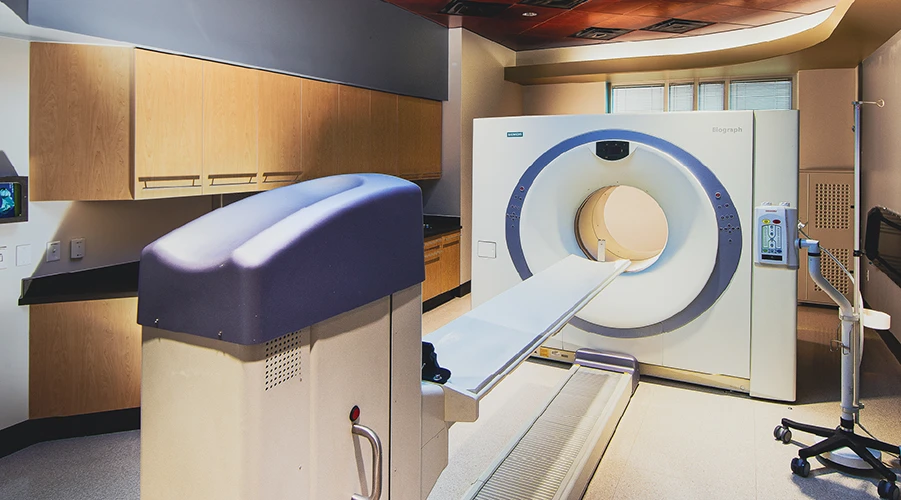Schedule your same-day X-ray now!
SMIL utilizes email and text notifications for scheduling, reminders, results, and feedback. We will never sell or share your information.
Positron Emission Tomography + Computerized Tomography.
A PET scan uses an injected radiotracer to measure important bodily functions such as blood flow, oxygen use, and sugar metabolism. The radiotracer bonds to proteins or sugars while emitting positrons, which interact with surrounding electrons to produce a chemical reaction that the scanner then detects. The radiation from the tracers pose little threat as they are quickly passed out of the body.
By overlaying images obtained through PET and CT, medical imaging is entering a new era. SMIL was the first medical imaging practice in the Phoenix metro area to offer this diagnostic advance.
In oncology, PET-CT helps detect tumors at their earliest, most treatable stage. CT provides a precise anatomical map of the body while PET evaluates the biochemical activity allowing us to see the cells "in action." Bringing these together, the Radiologist is able to accurately identify the tumor and how far it has spread. This makes PET-CT a valuable tool for the clinical evaluation of patients with most cancers, including head and neck cancer, esophageal cancer, lung cancer, breast cancer and colorectal cancer. PET-CT is also used to determine the stage of cancer accurately and to evaluate the effectiveness of cancer therapy. A final oncologic utility of PET-CT is the ability to differentiate benign from malignant tumors.
A break-through application of PET-CT is in neuroradiology, where the technology is used in evaluating patients with cognitive impairment. It can help identify between different dementias and other causes of cognitive decline.

The SMIL Technologist will begin your PET-CT scan by taking your baseline vitals (and blood sugar in some cases), and then administering the radiotracer intravenously. You will relax for about 1.5 hours while your body uptakes the tracer. You'll then be moved to the PET examination table and made to be comfortable.
Next, the table will move quickly through the scanner to determine the correct starting position for the scans. Then, the table will move slowly through the machine as the actual PET-CT scan is performed. The actual exam may take 20 to 40 minutes.
You may be asked to hold your breath during the scanning. Any motion, whether breathing or body movements, can lead to artifacts or blurring on the images.
As a precaution, you may be asked to remain at the SMIL site for a short time to monitor any reaction to the radiotracer. You will be able to eat or drink afterwards, but may be asked to avoid contact with pregnant persons or children for about 6 hours.
To prepare for a PET-CT scan performed by a SMIL Technologist, you should wear comfortable, loose-fitting clothing. You may be given a gown to wear during the procedure. Metal objects, including jewelry, eyeglasses, dentures and hairpins, may affect the PET-CT images and should be left at home or removed prior to your exam. You may also be asked to remove hearing aids and removable dental work. Women will be asked to remove bras containing metal underwire. You may be asked to remove any piercings, if possible.
You will be asked to abstain from eating or drinking for 4 hours prior to arrival. Water may be consumed. Your last food intake prior to your exam should be high in protein and low in carbohydrates. Avoid exercise or strenuous activities 24 hours prior to your scan.
Please inform your scheduler and SMIL Technologist if you are diabetic. You will be provided with instructions for fasting and recording your blood sugar.
You should inform your physician of all medications you are taking and if you have any allergies. If you have a known allergy to contrast dye, your doctor may prescribe medications (usually a steroid) to reduce the risk of an allergic reaction. These medications generally need to be taken 12 hours prior to administration of contrast material.
Also inform your doctor of any recent illnesses or other medical conditions and whether you have a history of heart disease, asthma, diabetes, and kidney disease or thyroid problems. Any of these conditions may increase the risk of an unusual adverse effect.
In addition, women should always inform their Radiologist and the PET-CT SMIL Technologist if there is any possibility that they may be pregnant.
If your infant or young child is having a PET-CT scan, there are measures that can be taken to ensure that the test will not be a cause of anxiety for either the child or parent.
Learn how to prepare for your specific exam in the preparations section.
There is always a slight risk associated with any exposure to radiation. However, the benefit of an accurate diagnosis will generally outweigh the risk, and no radiation remains in a patient's body after a PET examination.
PET scanning is, in general, not recommended for pregnant women unless medically necessary because of potential risk to the baby. Women should always inform their SMIL staff if there is any possibility that they are pregnant. Depending on the exam being done, the risk may be minimal.
NORTH SCOTTSDALE
PEORIA
GILBERT